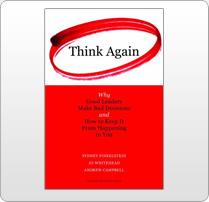Bob Selden reviews the latest leadership book: Think Again: Why Good Leaders Make Bad Decisions and How to Keep It From Happening to You.
Sydney Finkelstein, Jo Whitehead and Andrew Campbell, Harvard Business Press, Boston 2008.
 “Most leaders make bad decisions. Even great leaders can make bad decisions.” The introduction to “Think Again” leads with this statement. The authors Fnklestein, Whitehead and Campbell then proceed to show why. Most importantly, they provide a framework for recognising when such bad decisions may occur and how to safeguard against such decisions.
“Most leaders make bad decisions. Even great leaders can make bad decisions.” The introduction to “Think Again” leads with this statement. The authors Fnklestein, Whitehead and Campbell then proceed to show why. Most importantly, they provide a framework for recognising when such bad decisions may occur and how to safeguard against such decisions.
The book is in three parts – How your brain makes decisions; Why decisions go wrong; and Red flags and safeguards (for recognising and preventing bad decisions).
Part one reviews much of the research and current thinking on how the brain works. One particular point of interest that the authors note, is our propensity to tag all our major decisions with emotional tags – tags which can and often do, override rational thinking.
Part two chronicles many of the wider known decisions that have proven to be wrong, such as Kennedy’s Bay of Pigs invasion of Cuba, Wang Computers’ disastrous (the company now no longer exists) decision to opt for their own proprietary operating system rather than adopt the industry IBM PC standard, and Margaret Thatcher’s Poll Tax debacle. But the authors also provide many case studies of practising managers who have made mistakes in areas such as change management, taking on new roles, and new product or production processes etc. These should prove most insightful to managers at all levels.
All of the cases in Part 2 are used to illustrate the four reasons for bad decision making – misleading experiences, misleading pre-judgments, inappropriate self-interest and inappropriate attachments. The authors describe these as potential “red flags”. In addition to cases, the authors describe a number of studies to demonstrate their point. One that stood out was on “inappropriate self-interest” where 139 experienced auditors (not students) were asked to evaluate a case study to ensure the firm met certain standards.
Half the group were told they had been hired by the firm to do this analysis and the other half told they had been hired by another firm wishing to trade with this firm. Those who had been told they were hired by the firm were 30% more likely to find the firm met the standards than those hired by the potential customer!
Part three then describes the four “safeguard” strategies for preventing bad decisions – experience, data and analysis; group debate and challenge; governance; and monitoring. None of these will be new to the reader. However, it is the practical and structured way the authors show how these safeguards can be used, that make this book really worthwhile.
There’s also a Database of Cases and a Database of Safeguards with examples that summarise how the red flags have been identified and the safeguards can be used in practice. These make an excellent “how to” and easy reference source for practising managers.
This is a good book. It’s a dense book – and it needs to be, for the subject is complex. The authors have done a great job simplifying the subject and at the same time providing us with a practical way of identifying (red flags) when we might be likely to make a bad decision and how to help avoid (safeguards) making one. It would be a very useful text for any serious management student and will also be highly useful to any manager serious about minimising the chance of making poor decisions.
Bob Selden has been a career trainer for more than 30 years – in fact it’s his lifetime passion. Bob can be contacted via www.nationallearning.com.au. If you’d like to see where his training career has led, check out the website for his book ‘What To Do When You Become The Boss’ at www.whenyoubecometheboss.com .
Bob Selden reviews the latest leadership book: Think Again: Why Good Leaders Make Bad Decisions and How to Keep It From Happening to You.
Sydney Finkelstein, Jo Whitehead and Andrew Campbell, Harvard Business Press, Boston 2008.
 “Most leaders make bad decisions. Even great leaders can make bad decisions.” The introduction to “Think Again” leads with this statement. The authors Fnklestein, Whitehead and Campbell then proceed to show why. Most importantly, they provide a framework for recognising when such bad decisions may occur and how to safeguard against such decisions.
“Most leaders make bad decisions. Even great leaders can make bad decisions.” The introduction to “Think Again” leads with this statement. The authors Fnklestein, Whitehead and Campbell then proceed to show why. Most importantly, they provide a framework for recognising when such bad decisions may occur and how to safeguard against such decisions.
The book is in three parts – How your brain makes decisions; Why decisions go wrong; and Red flags and safeguards (for recognising and preventing bad decisions).
Part one reviews much of the research and current thinking on how the brain works. One particular point of interest that the authors note, is our propensity to tag all our major decisions with emotional tags – tags which can and often do, override rational thinking.
Part two chronicles many of the wider known decisions that have proven to be wrong, such as Kennedy’s Bay of Pigs invasion of Cuba, Wang Computers’ disastrous (the company now no longer exists) decision to opt for their own proprietary operating system rather than adopt the industry IBM PC standard, and Margaret Thatcher’s Poll Tax debacle. But the authors also provide many case studies of practising managers who have made mistakes in areas such as change management, taking on new roles, and new product or production processes etc. These should prove most insightful to managers at all levels.
All of the cases in Part 2 are used to illustrate the four reasons for bad decision making – misleading experiences, misleading pre-judgments, inappropriate self-interest and inappropriate attachments. The authors describe these as potential “red flags”. In addition to cases, the authors describe a number of studies to demonstrate their point. One that stood out was on “inappropriate self-interest” where 139 experienced auditors (not students) were asked to evaluate a case study to ensure the firm met certain standards.
Half the group were told they had been hired by the firm to do this analysis and the other half told they had been hired by another firm wishing to trade with this firm. Those who had been told they were hired by the firm were 30% more likely to find the firm met the standards than those hired by the potential customer!
Part three then describes the four “safeguard” strategies for preventing bad decisions – experience, data and analysis; group debate and challenge; governance; and monitoring. None of these will be new to the reader. However, it is the practical and structured way the authors show how these safeguards can be used, that make this book really worthwhile.
There’s also a Database of Cases and a Database of Safeguards with examples that summarise how the red flags have been identified and the safeguards can be used in practice. These make an excellent “how to” and easy reference source for practising managers.
This is a good book. It’s a dense book – and it needs to be, for the subject is complex. The authors have done a great job simplifying the subject and at the same time providing us with a practical way of identifying (red flags) when we might be likely to make a bad decision and how to help avoid (safeguards) making one. It would be a very useful text for any serious management student and will also be highly useful to any manager serious about minimising the chance of making poor decisions.
Bob Selden has been a career trainer for more than 30 years – in fact it's his lifetime passion. Bob can be contacted via www.nationallearning.com.au. If you'd like to see where his training career has led, check out the website for his book 'What To Do When You Become The Boss' at www.whenyoubecometheboss.com .






